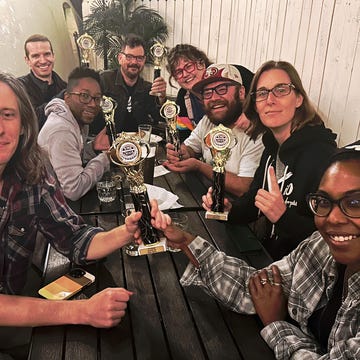In 2007, Shalom Auslander published his first memoir, Foreskin’s Lament, a coming-of-age story about growing up in an oppressive ultra-Orthodox family in upstate New York. Fierce and funny, it was a literary counterweight to the notion that God is great. Or even good. In the writer’s telling, God is vindictive, petty, and cruel.
A regular on This American Life and the creator of the series Happyish for Showtime, Auslander has found success, well, somewhat frustrating. His 2012 novel, Hope: A Tragedy, drew the attention of Philip Seymour Hoffman, who became Auslander’s friend and confidant as they worked on an adaptation before the actor’s death in 2014. A decade-in-the-making stage version of one of his books has been held up by pretty much everything you can imagine, including an actors’ strike.
Auslander’s new book, also a memoir, is titled Feh and details the psychic damage his upbringing hath wrought. Even amid the sunshine of Los Angeles, where Auslander pursues his dream of writing for television, the heavy gloom of his Monsey, New York, childhood looms over everything. We spoke recently by phone as Auslander was—what else?—driving through L.A. traffic.
This interview has been edited for brevity and clarity.
There’s a recurring line in your current book that says, “Stories are powerful things.” What is the significance of the repetition of that line?
I was raised with “Feh,” which is Yiddish for “Oh, disgusting.” I was told that about myself. For a long time, I thought that my struggle was with God himself, and it is to some degree. But I got very close with Phil Hoffman before he passed, and he was the first person I’d met that had exactly the same outlook on himself, and was using art to try and find a way out of that, to try and rewrite that. I started to think that maybe the story is the thing that’s the problem here. And so I started to do a lot of reading about stories and the way story works in the human mind and human society and human culture. And we are literally a storytelling animal. It’s how we understand the whole world.
The story is the plague, and as a person who writes and knows people who either act or make art or sing or dance or whatever, who just try and get through their fucking day, I’ve been trying to rewrite that story. I’ve been trying to find a story that isn’t destructive.
In promotional materials for Feh, there’s an interview with you, and I noticed that the list of people you think won’t like this book is about three times as long as the list of people you think will like it.
And I had to pad that!
Is the secret to making art essentially not giving a shit what anyone thinks?
I think it’s the hardest part. There’s always this debate: Can writing be taught? Is it a craft? Of course, it can be taught. I can tell you what’s going on in act 3 doesn’t really work or the character doesn’t make me feel. But you’re not going to get to anything meaningful for your life if you give a shit at all, and that can’t be taught. The biographies of all the writers that I read speak to some great truth that came out of a sort of paroxysm of, you know, Kafka sitting there in a room not writing and then finally just saying, “Fuck it,” and writing. This guy turns into a bug and guess what? His parents kill him. That’s hilarious. And I know how good he felt writing that. It was just the sort of “Oh, fuck it.” That’s the skill, and it’s not easy, particularly today, where all you need to do is google yourself and if you’re looking for a reason to throw yourself off a roof, you’ll find it in the first two pages. But that’s the job. You can’t be a doctor and say you don’t like the hours.
You write that God made sure there wouldn’t be Hollywood interest in a previous book of yours. Is God doing any better on that front with the new book?
Well, you know, God plays the long game. So he’s not going to just cancel it. That would be no fun. So more likely, someone will come in and say, “Hey, I really like your book, I wanna do a film of it.” And I’ll be like, “Oh, wow, that’s great.” And then first of all, it will be “We just wanna do the parts about [Hoffman].” And then it will be “Do you have any video of him doing horrible things?” And I’ll still be like, “OK, you know what? It’s money, we need money—fine.” And that’s when COVID 2 will hit.
He just likes that gag. You know how in old Greek plays, at the end, God comes down and saves everything? In the comedy that is my life, he comes down and fucks everything up.•












